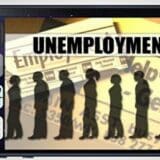

On January 16, 2013, just after 5 a.m., 12 sheriff’s deputies and 10 Portland police officers forcefully evicted the original Portland foreclosure fighters – Debbie and Ron Austin – from their NE Portland home. The eviction was at the demand of the government sponsored and funded mortgage finance vehicle, Fannie Mae.
The family was evicted, but their home is not empty. A force of armed private security guards from McRoberts Security was immediately installed in Debbie Austin’s home. The guards have been on 24-hour duty in the home ever since.
Typical cost for private security indicates that Fannie Mae is spending $480-$600 a day, or $15,000 a month on 24-hour armed guards. Since the Austins’ January eviction, Fannie Mae has spent nearly $50,000 of essentially public money to keep one home empty.
“It was horrifying. I was standing on the sidewalk at 6 a.m. in my pajamas watching the sheriff change the locks and seeing armed security forces enter my home,”


 Bestselling novelist Lisa See’s Los Angeles roots go back five generations – the Chinese branch of her biracial family has been involved in 100 years of Chinatown’s history. See, the author of Dreams of Joy and Shanghai Girls, will be the keynote speaker at the Los Angeles Alliance for a New Economy’s annual Women for a New Los Angeles Luncheon on May 10. She spoke to Frying Pan News about women writers, Walmart and changes in L.A.
Bestselling novelist Lisa See’s Los Angeles roots go back five generations – the Chinese branch of her biracial family has been involved in 100 years of Chinatown’s history. See, the author of Dreams of Joy and Shanghai Girls, will be the keynote speaker at the Los Angeles Alliance for a New Economy’s annual Women for a New Los Angeles Luncheon on May 10. She spoke to Frying Pan News about women writers, Walmart and changes in L.A.
Frying Pan News: Your family’s been here longer than most.
Lisa See: We are part of a continuum of women and men who came here and continue to come here. And it’s not only men who come to a place, as pioneers or for a new job. A great-great aunt came here in 1915 from Colorado, opened a millinery shop and caught TB. My great-great grandmother and her husband came West to Waterville,


 Barack Obama’s nomination of Penny Pritzker as Commerce Secretary was a poke in the eye of the American labor movement. The niece of the founder of the Hyatt Hotel chain and current member of the company’s board, Pritzker is a key player in what UNITE HERE calls “the worst hotel employer in America.”
Barack Obama’s nomination of Penny Pritzker as Commerce Secretary was a poke in the eye of the American labor movement. The niece of the founder of the Hyatt Hotel chain and current member of the company’s board, Pritzker is a key player in what UNITE HERE calls “the worst hotel employer in America.”
Go to the union’s Hyatt Hurts website for info on its global boycott and then click to UNITE HERE’s clever and diplomatic call for Pritzker to leave the board and be replaced by a hotel worker.
But even if this appointment can be turned into a tactical advantage for the union campaign, the Pritzker family brand as notorious union busters has many progressives irritated or worse by Obama’s choice. (Recently workers at two Hyatts in Long Beach California won union representation after a tough three-year battle which included the passage of Proposition N,


Pete Seeger, arguably the person most responsible for the revival and popularity of folk music in the United States, turns 94 on May 3. Seeger’s unparalleled life led him to engage in nearly all of the leading social movements of the 20th century, including the labor sit-ins in the 1930s, the economic justice campaigns of the 1940s, fighting the blacklist and promoting peace in the 1950s, the civil rights movement of the 1950s and 1960s and the environmental movement that began in the 1970s. Fortunately, Seeger’s extensive writings are now available in a new book, Pete Seeger: In His Own Words, selected and edited by Rob Rosenthal and Sam Rosenthal. The book offers unusual insight into Seeger’s motivations, and for his relentless optimism in the face of adversity. Seeger has spoken the truth for nearly 100 years, and his writings offer inspiration to all those working for peace, justice and for a better world.


 The American public knows it’s downwardly mobile. What it doesn’t know is what it can do to arrest, much less reverse, that trend.The public’s awareness of its plight was evident in the Allstate/National Journal poll released last Thursday. Half of the respondents – 49 percent – said that only the upper class could realistically expect to be able to pay for their children’s college education. Another 46 percent said that only the upper class could realistically anticipate having enough money to cope with a health emergency or job loss, while 45 percent said that only the upper class should expect to be able to save enough to retire comfortably. Fully 59 percent said they were concerned about falling out of their current economic class over the next few years.
The American public knows it’s downwardly mobile. What it doesn’t know is what it can do to arrest, much less reverse, that trend.The public’s awareness of its plight was evident in the Allstate/National Journal poll released last Thursday. Half of the respondents – 49 percent – said that only the upper class could realistically expect to be able to pay for their children’s college education. Another 46 percent said that only the upper class could realistically anticipate having enough money to cope with a health emergency or job loss, while 45 percent said that only the upper class should expect to be able to save enough to retire comfortably. Fully 59 percent said they were concerned about falling out of their current economic class over the next few years.
Clearly, the expectations of economic security and mobility that were widely shared by Americans in the decades after World War II have vanished,


At a time when there are so few programs that create good career-path jobs, it’s exciting to see one that is doing just that. RePower LA worked with IBEW Local 18 and the Los Angeles Department of Water and Power to support the creation of the Utility Pre-Craft Training (UPCT) program. Launched in 2011, this is a program that creates real jobs and has a real impact on the lives of real everyday people.
Recently, I was asked to attend a training session at a labor-management joint-training institute. I was excited to talk one-on-one with the men and women who have been accepted into this unique on-the-job training program that prepares workers for careers in the utility.
There were two things that struck me immediately when I met this group of trainees. First was the incredible diversity of the group: old and young,


On Wednesday, community activists and homeowner groups got some good news from Washington. President Obama announced that he was removing Ed DeMarco, the Bush-appointed acting director of the Federal Housing Finance Agency (FHFA). FHFA regulates Fannie Mae and Freddie Mac, the bailed-out mortgage financiers that together own or guarantee 60 percent of the nation’s mortgages.
For more than a year, activists have waged a “Dump DeMarco” campaign because of his stubborn refusal to help troubled homeowners avoid foreclosure by requiring banks to modify “underwater” mortgages that are higher than the market value of the homes. Under orders from DeMarco, both Fannie Mae and Freddie Mac have refused to permit banks to write down mortgage principal for underwater homeowners. He called such write-downs a “free lunch” that would discourage homeowners from paying their mortgages.
But Obama’s Treasury Department countered that write-downs would save money by reducing the chances homeowners would default on their loans.
» Read more about: Will Senate Keep Sacked “Random Idiot” at FHFA? »


 The horrific collapse of a Bangladeshi garment factory has sparked appropriate global outrage, with advocates, pundits and politicians calling for tougher laws to protect exploited workers in Third World countries. Yet this tragedy, like many before it, seems far removed from the reality of the American workplace.
The horrific collapse of a Bangladeshi garment factory has sparked appropriate global outrage, with advocates, pundits and politicians calling for tougher laws to protect exploited workers in Third World countries. Yet this tragedy, like many before it, seems far removed from the reality of the American workplace.
It isn’t nearly as remote as we might think — a fact eerily underscored by the deadly fertilizer plant fire in Texas that preceded the Bangladeshi catastrophe.
While the surreal quality of the Texas disaster was somewhat unique, the deaths and injuries caused by it were not. Every year thousands of American workers die on the job, and hundreds of thousands are injured.
The reason? Lax worker safety laws, and weak enforcement of those that do exist. Another way of putting it is that we are letting men and women die simply by failing to afford them basic protections.
 The Fed’s policy of keeping interest rates near zero is another form of trickle-down economics.
The Fed’s policy of keeping interest rates near zero is another form of trickle-down economics.
For evidence, look no further than Apple’s decision to borrow a whopping $17 billion and turn it over to its investors in the form of dividends and stock buy-backs.
Apple is already sitting on $145 billion. But with interest rates so low, it’s cheaper to borrow. This also lets Apple avoid U.S. taxes on its cash hoard socked away overseas where taxes are lower.
Other big companies are doing much the same on a smaller scale.
Who gains from all this? The richest 10 percent of Americans who own 90 percent of all shares of stock.
But little or nothing is trickling down. The average American can’t borrow at nearly the low rates Apple or any other big company can. Most Americans no longer have a credit rating that allows them to borrow much of anything.
» Read more about: Apple’s Borrowing Creates Dividends, Not Jobs »


The economy is personal. It colors our decisions about everything: when to have kids, what city to move to, who to vote for, who to sleep with. And nobody knows this better than the biggest generation in history: the Millennials. These 80 million Americans have come of age during the worst economic recession since the Depression, an experience that will have profound repercussions on our lives—and our political consciousness.
I call us the Crash Generation. For many of us in our twenties, 2008 was a period awash in exhilarating highs and terrifying lows. The words “depression,” “economic crisis,” “mass layoffs” and “foreclosures,” along with “hope,” “change” and “Obama,” all clogged the headlines and made their way into whiskey-fueled party conversations. Washington and the media had never been so frank about the cataclysmic proportions of a financial crash. And a candidate had never kicked young voters into such high gear like Barack Obama,
» Read more about: Generation Crash: Millennials to the Rescue »